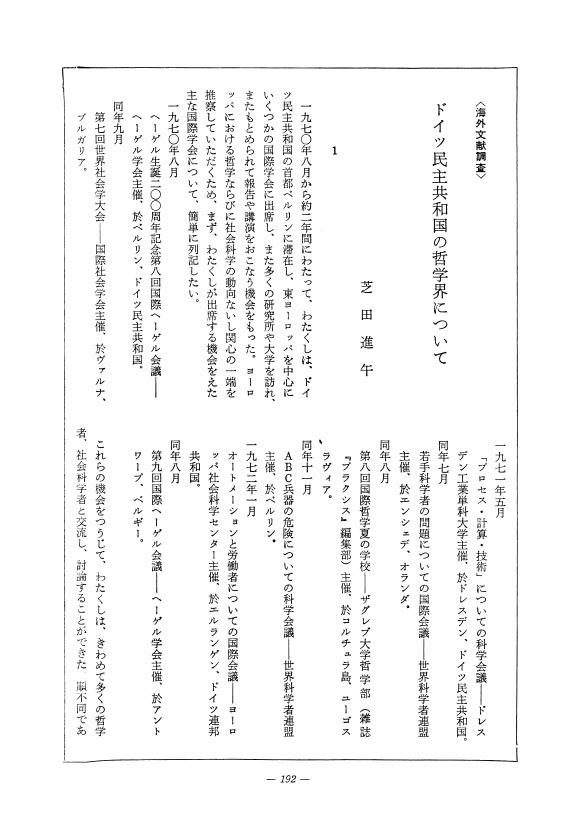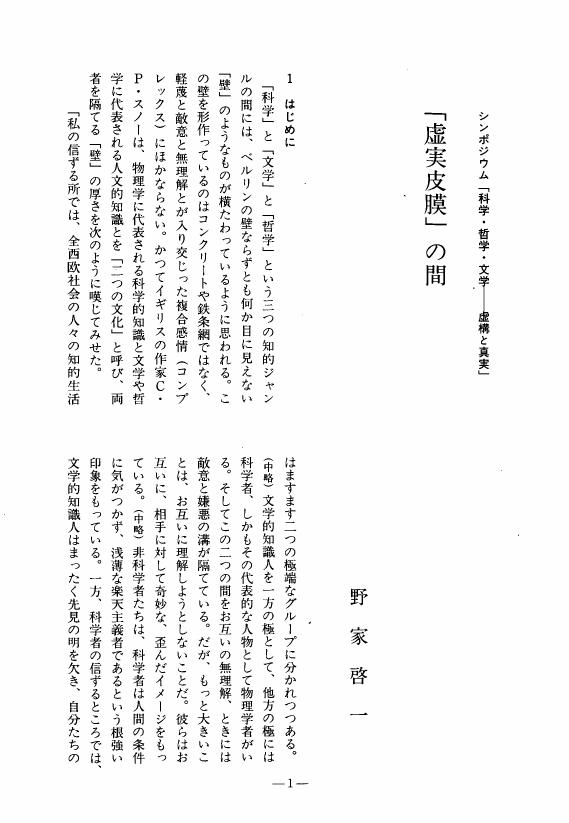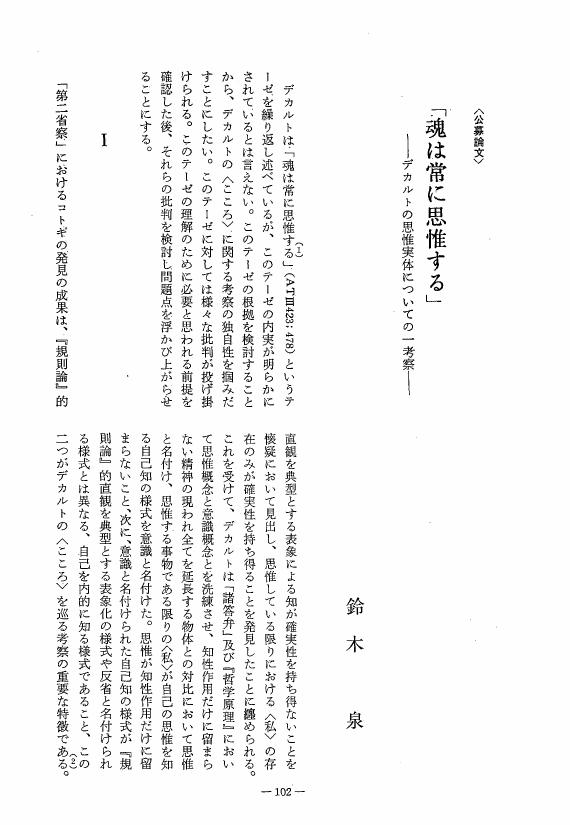1 0 0 0 OA ドイツ民主共和国の哲学界について
- 著者
- 芝田 進午
- 出版者
- 日本哲学会
- 雑誌
- 哲学 (ISSN:03873358)
- 巻号頁・発行日
- vol.1973, no.23, pp.192-200, 1973-05-01 (Released:2009-07-23)
- 参考文献数
- 9
- 著者
- 渡辺 二郎
- 出版者
- 日本哲学会
- 雑誌
- 哲学 (ISSN:03873358)
- 巻号頁・発行日
- vol.1980, no.30, pp.1-28, 1980-05-01 (Released:2009-07-23)
1 0 0 0 OA 制度と社会についての基礎理論・序説
- 著者
- 中村 雄二郎
- 出版者
- 日本哲学会
- 雑誌
- 哲学 (ISSN:03873358)
- 巻号頁・発行日
- vol.1967, no.17, pp.115-139, 1967-03-31 (Released:2009-07-23)
- 参考文献数
- 23
1 0 0 0 OA フッサールの論理学観 形式主義批判を中心として
- 著者
- 高橋 哲哉
- 出版者
- 日本哲学会
- 雑誌
- 哲学 (ISSN:03873358)
- 巻号頁・発行日
- vol.1982, no.32, pp.160-169, 1982-05-01 (Released:2009-07-23)
フッサール現象学の生誕の書が『論理学研究』であったことはよく知られていよう。現象学はまず何よりも、学問論 (Wissenschaftslehre) としての純粋論理学の理念を闡明し、その実現の端緒を拓こうとするこの書の努力の中で、「論理的なものの現象学 Phanomenologie des Logischen」 (LU.II/8,III) として登場してきたのである。その後、超越論的現象学の理念が確立されると、純粋論理学の基礎づけは課題の緊急性を失ったが、しかしフッサール思想における「論理的なもの」の意義は決して減ずることがなかった。というのも、フッサールは結局、「形式論理学」を「形式的学問論」として、「実質論理学」を「質料的学問論」として構想しただけでなく、それらに究極の権利を付与すべき超越論的現象学そのものにも、「究極の学問論」としての「超越論的論理学」の機能を認めていたからである (XVII,20,157f.,296)。それ故、フッサール現象学の意義と射程を見定めるためには、それらすべての企ての共通の根である「論理的なもの」、或いは一般にロゴス (Logos) なるものの本質を解明することが不可欠の作業であるが、本稿での我々の課題は、フッサールにおいて「論理的なもの」の理念のいわば母胎となった形式論理学の場面に照準し、そこでフッサールが行なった形式主義批判の内実を検討することによって、その作業の一端に寄与しようとすることである。
- 著者
- 門屋 環
- 出版者
- 日本哲学会
- 雑誌
- 哲学 (ISSN:03873358)
- 巻号頁・発行日
- vol.1969, no.19, pp.251-262, 1969-03-31 (Released:2009-07-23)
- 参考文献数
- 20
Adam Smith believed that England in 18 century increased to social power of production by robust self-loved mind in social instinct.Smith insisted the individual's social instinct to continued public welfare by moral sentiment above to religious sentiment, and realized the world of religious capitalism his expected.
1 0 0 0 OA ドゥンス・スコトゥスの形相的区別について 意味論的観点から
- 著者
- 本間 裕之
- 出版者
- 日本哲学会
- 雑誌
- 哲学 (ISSN:03873358)
- 巻号頁・発行日
- vol.2019, no.70, pp.250-265, 2019-04-01 (Released:2019-04-18)
Almost all interpreters agree that the formal distinction (distinctio formalis) of Duns Scotus is located between formalities/entities/realities. This concept is characterized as a “mediate distinction” between the real distinction (distinctio realis), which exists without intellect, and the distinction of reason (distinctio rationis), which is produced only by the activity of the intellect. According to Scotus, the formal distinction has both a real basis and a relationship to intellect. These characterizations do not provide a complete exposition of formal distinction; rather, they raise questions about the nature of formality: what is its ontological status, and how formal distinction relates to intellect. Major interpreters, such as Maurice Grajewski, Allan Wolter, and Michel Jordan, have not provided clear answers to these questions. The main purpose of the present article is to respond to these questions by describing the system of formal distinction in the thought of Scotus. First, we consider Scotus’s motivation to introduce this distinction by analyzing his answer to the question “Whether this proposition ‘man is animal’ is true?” His aim in this question of his Quaestiones in librum Porphyrii Isagoge, if we adopt the language of current analytical philosophy, is to put forward a truthmaker theory. And this interpretation is further elucidated in his (probably) late work, Quaestiones super libros Metaphysicorum Aristotelis. Second, depending on this understanding, we describe formal distinction using the mathematical idea of homomorphism. In Scotus’s thinking, the homomorphic map φ, which preserves the structure of propositions, can be possibly defined as follows: φ: C → M (where C is the logical or intentional domain and M is the metaphysical or existential one). We call this map φ the analytical map. This mathematical model suggests a distinct formulation of formal distinction. Let c, c1, and c2 be concepts, R1 and R2 be relations between concepts, f, f1, and f2 be formalities, and R1′ and R2′ be relations between formalities. There then exists an analytical mapping such that φ(cR1c1) = fR1 ′f1 and φ(cR2c2)= fR2′ f2; the distinction, then, between f1 and f2 is a formal distinction. This interpretation provides a foundation for Wolter’s idea that formality is an objective basis for a concept produced by intellect.
1 0 0 0 OA 「虚実皮膜」の間
- 著者
- 野家 啓一
- 出版者
- 日本哲学会
- 雑誌
- 哲学 (ISSN:03873358)
- 巻号頁・発行日
- vol.1990, no.40, pp.1-18, 1990-04-01 (Released:2009-07-23)
1 0 0 0 OA 道徳的価値の規範性 構成主義に基づく一解釈
- 著者
- 福間 聡
- 出版者
- 日本哲学会
- 雑誌
- 哲学 (ISSN:03873358)
- 巻号頁・発行日
- vol.2008, no.59, pp.293-308,L22, 2008-04-01 (Released:2010-07-01)
- 参考文献数
- 15
Constructivism can usefully be seen as a view about normativity. It denies both that normativity is a constraint based on a fact which is prior to and independent of our stance (realism), and also that it is a merely causation originating in our conative attitudes (noncognitivism). It takes normativity to be a requirement which is derived from our rational choices and which is constructed by our practical reason. On this constructivist view, it becomes clear that normativity is constitutive of those who ‘are agents who make choices and judgments on the basis of reasons’. In this article, by examining moral judgments about the good from the viewpoint of Korsgaard's constructivism, I consider how it explains the normativity of moral value, and how it presents a possible means of dissolving the controversy between realism and non-cognitivism about moral value. First of all, I clearly specify what it is to be constructivist (sec. 2). Secondly, through examining a constructivist criticism of realism (sec. 3-4) and the rationalist theory about the good which constructivism advocates (sec. 5), I show that an important feature of the constructivist account of the normativity of moral value is that it emphasizes the procedure of making moral judgments in the light of our multiple agency. Thirdly, I set out what it is to be a reason-a concept which constructivism presupposes (sec. 6). Lastly, I reply to some objections to constructivism (sec. 7). In this article, I particularly take up G. E. Moore's realism and investigate onstructivism's explanation of normativity by contrast with this.
1 0 0 0 OA 「魂は常に思惟する」 デカルトの思惟実体についての一考察
- 著者
- 鈴木 泉
- 出版者
- 日本哲学会
- 雑誌
- 哲学 (ISSN:03873358)
- 巻号頁・発行日
- vol.1991, no.41, pp.102-112, 1991-04-01 (Released:2009-07-23)
1 0 0 0 OA カントの良心論の革新性について
- 著者
- 菅沢 龍文
- 出版者
- 日本哲学会
- 雑誌
- 哲学 (ISSN:03873358)
- 巻号頁・発行日
- vol.1992, no.42, pp.169-179, 1992-04-01 (Released:2009-07-23)
1 0 0 0 OA カントにおける「真とみなすこと」概念
- 著者
- 繁田 歩
- 出版者
- 日本哲学会
- 雑誌
- 哲学 (ISSN:03873358)
- 巻号頁・発行日
- vol.2020, no.71, pp.149-158, 2020-04-01 (Released:2020-05-12)
- 参考文献数
- 17
1 0 0 0 OA 自己欺瞞における意図
- 著者
- 浅野 光紀
- 出版者
- 日本哲学会
- 雑誌
- 哲学 (ISSN:03873358)
- 巻号頁・発行日
- vol.2009, no.60, pp.137-152_L9, 2009 (Released:2010-11-09)
- 参考文献数
- 38
Can we be unaware of the intention which is actually guiding our own purposeful behavior? This is the question I shall tackle in this paper, discussing the paradoxical nature of the phenomenon: self-deception. When the deceiver and the deceived are one and the same person,the deceptive intention of the former seems to be easily detected by the latter, rendering the whole project self-defeating. But what exactly is intentional about self-deception? Or is it an unintentional process after all?In this paper I shall focus on the various data-manipulating strategies in which the self-deceiver engages during the process of making himself believe what he knows to be false. These are intentional activities the motive of which is to reduce the anxiety caused by the unpleasant true belief. I will clarify the conditions under which the privileged access to our own mental states breaks down and secure the ontological possibility of self-deception without reducing it either to unintentional wishful thinking or to ‘Pascal’s wager’, namely an explicit conscious attempt at self-reformation.
1 0 0 0 OA ブラッドリー的無限後退は事態の存在論にとって無害なのか
- 著者
- 秋葉 剛史
- 出版者
- 日本哲学会
- 雑誌
- 哲学 (ISSN:03873358)
- 巻号頁・発行日
- vol.2010, no.61, pp.149-164_L9, 2010 (Released:2011-01-18)
- 参考文献数
- 10
According to the widely accepted correspondence theory of truth, each atomic contingent truth has its own truth-maker, i.e., an entity existing in the world that makes contingent proposition true. And at least for the metaphysical realist, the first and obvious candidates for truth-maker are entities called “facts” or “states of affairs”. These are entities normally designated by expressions like “a's being F” or “the fact that a is F”.Although it seems natural to assume that states of affairs exist, there is a famous objection to this assumption, known as “Bradley's regress”. Roughly put, the objection proceeds as follows. The states of affairs are supposed to be complex entities. However, what accounts for the unity of constituents in the state of affairs, say, Fa? If one appeals to the exemplification relation E to bind the constituents a and F together, the explanatory job is not yet finished. For, in that case, the unity of a, F, and E now raises the same problem. It is no use to add further and further exemplification relations E', E'', E'''..., because each time one adds a new relation, one gets only a new explanatory task, and never the unity of a and F. Thus, since the unity of constituents cannot be accounted for, the assumption that states of affairs exist should be regarded as groundless.Against this objection, F. Orilia replies as follows. Though the regress objection above seems to seriously threaten the assumption that states of affairs exist, in fact it does not. For, the thought that there is an infinite explanatory sequence does not involve any inconsistency. As for myself, I agree with him as far as his last claim is concerned, namely the claim that there is no inconsistency in the idea of infinite explanatory sequence. However, I disagree with him as far as the evaluation of the regress objection is concerned. I claim that the alleged explanatory sequence generated in the regress objection is in fact vacant in its explanatory power, and hence that this objection in any way shows the failure of explanatory task.
1 0 0 0 IR テアイテトス篇におけるソクラテスの産婆術と教育
- 著者
- 東 敏徳
- 出版者
- 三田哲學會
- 雑誌
- 哲学 (ISSN:05632099)
- 巻号頁・発行日
- vol.124, pp.139-156, 2010-03
投稿論文
- 著者
- 宮崎 文典
- 出版者
- 日本哲学会
- 雑誌
- 哲学 (ISSN:03873358)
- 巻号頁・発行日
- vol.2011, no.62, pp.329-344_L19, 2011
In Plato's <i>Gorgias</i> 474c4-475e6, the issue of whether it is worse to do injustice or suffer it is considered. Socrates and Polus discuss this issue, regarding it as a problem in relation to their own choice of action and way of life. Polus thinks that suffering injustice is worse than doing it. He also thinks, on the other hand, that doing injustice is more shameful than suffering it. Socrates shows him that it is by exceeding in evil that doing injustice is more shameful than suffering it. As a result, Polus concedes that doing injustice is worse than suffering it.<br>Here, we can find a surface and a deeper significance in the judgment that doing injustice is more shameful than suffering it. At the surface level, (1) a ‘fine or shameful’ judgment has no effect on a judgment of good or bad, and (2) a ‘fine or shameful‘ judgment is not linked to one's choices of action and way of life. However, the judgment that doing injustice is more shameful indicates, deep down, a truer sense of good and bad which are not equated with pleasure and pain, i. e., the judgment reveals what is good and bad for the soul. In this discussion, Polus is, at first, only aware of the surface meaning of his own judgment that doing injustice is more shameful. Socrates shows him the deeper meaning.<br>We can find, here, a fundamental problem with rhetoric: rhetoric concerns persuasion about what is just and unjust, and, faced with public opinion, orators cannot deny that what is just is fine and what is unjust is shameful; but rhetoric cannot make clear the true meaning of the fineness of justice and the shamefulness of injustice, because it aims at pleasure without regard for the good for the soul. Rather, the fineness of justice and the shamefulness of injustice are based on taking care of the soul by political <i>techne</i>.
1 0 0 0 OA 私的言語と言語ゲーム
- 著者
- 奥 雅博
- 出版者
- 日本哲学会
- 雑誌
- 哲学 (ISSN:03873358)
- 巻号頁・発行日
- vol.1971, no.21, pp.163-171, 1971-05-15 (Released:2009-07-23)
- 参考文献数
- 42
1 0 0 0 死すべき者にとっての不死:プラトン『饗宴』に於けるエロース観
- 著者
- 小野木 芳伸
- 出版者
- 日本哲学会
- 雑誌
- 哲学 (ISSN:03873358)
- 巻号頁・発行日
- vol.1995, no.46, pp.11-20,1, 1995
My claim here is that, as to the two characters of Erôs "intermediate" and "procreation", the former expresses its character of desire distinguished from its object-thing and that the latter is the purpose (not the object-thing) of this desire. And the crucial points in this formula are: 1) it is not "right opinion" but "philosopher" that exemplifies the "intermediate" between ignorance and wisdom which expresses the desire proper to Erôs; 2) the "procreation" which is the final purpose of Erôs is not a succession of things of the same kind but the action of procreation itself (i.e. the true virtue).
- 著者
- 東 敏徳
- 出版者
- 三田哲學會
- 雑誌
- 哲学 (ISSN:05632099)
- 巻号頁・発行日
- vol.129, pp.165-187, 2012-03
投稿論文
1 0 0 0 言葉と相:クラテュロス対話篇を手懸りにして
- 著者
- 菅谷 慎
- 出版者
- 日本哲学会
- 雑誌
- 哲学 (ISSN:03873358)
- 巻号頁・発行日
- vol.1969, no.19, pp.219-234, 1969
I attempted to interprete the “Cratylus” in which plato set forth his philosophy of language.
1 0 0 0 IR プラトンの「クラテュロス」における「名前の正しさ」
- 著者
- 中沢 務
- 出版者
- 日本哲学会
- 雑誌
- 哲学 (ISSN:03873358)
- 巻号頁・発行日
- no.44, pp.p166-175, 1994-04







